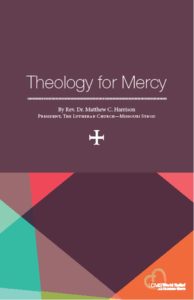 The Lord be with you
The Lord be with you
When a disaster hits, say a hurricane or earthquake, the Church is quick to swing into action. We do this almost as a natural reflex. However, sometimes, our natural reflexes are in error. When Jesus tells us, “Do not resist the one who is evil. But if anyone slaps you on the right cheek, turn to him the other also,” one must admit that the instruction goes against our natural reflexes (Matthew 5:39). That leaves us with the question, is it theologically sound for us, as the Church, to give our resources and time in helping those who are not the Church and may well never be? Is it theologically sound for us to join arms with people who are not in fellowship with us in extending that aid? Is our participation is such things like Orphan Grain Train, digging wells in villages in Africa, fighting Malaria, making sleeping bags for the homeless, or even our community garden, simply an human emotional response, or are there deeper theological, biblical, Lutheran, reasons? To be honest, I have met people who believe “the Church” has no role beyond the walls of their building. Are they right?
“Theology for Mercy” is part of the “Mercy Essay” series of pamphlets made available on line by the Lutheran Church-Missouri Synod. It is only eight pages long, with an additional ten “topics for discussion” at the end. It is written by Rev. Dr. Matthew C. Harrison, our Synod President. In it he explores the theological reasons for a Lutheran Church to become involved in corporate acts of mercy. Perhaps the best way to read this essay is to read the discussion topics at the end first. That can guide our minds as we read, helping us to know what to focus on. I can easily recommend this essay, not only to Lutherans in general, but to all Christians who desire a theological foundations for a congregation’s participation in organized, Church, acts of mercy. It is also good reading for those who feel their local church should not participate in mercy missions beyond their own membership.
